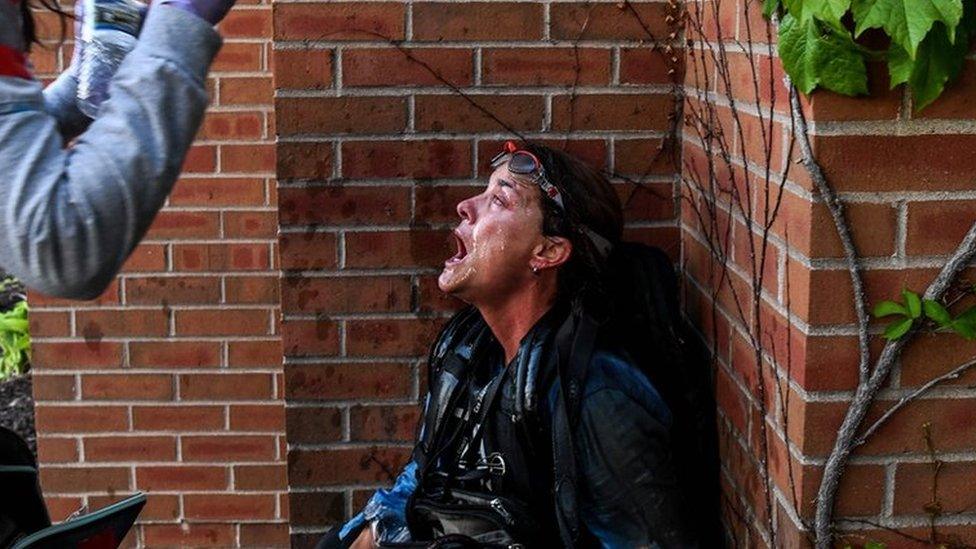George Floyd death: Archbishop attacks Trump as US protests continue
- Published
Trump declares himself the "law and order president"
Washington's Catholic archbishop has strongly criticised President Donald Trump's visit to a shrine as civil unrest continues in the US over the death of a black man in police custody.
Tuesday's visit "manipulated" the Saint John Paul II National Shrine, Archbishop Wilton D Gregory said.
Meanwhile, tens of thousands of people joined largely peaceful demonstrations in cities across the country.
In New York City, protesters defied an earlier curfew.
Traffic police were deployed to stop a repeat of the previous night's looting in Manhattan, and there were no reports of major incidents.
At least 40 cities have imposed strict curfew measures after days of violent protests sparked by the killing of George Floyd, 46, in Minneapolis on 25 May.
In Atlanta, police fired tear gas to disperse a demonstration, external near Centennial Olympic Park, reports said.
'I'm tired of being afraid': Why Americans are protesting
Earlier, Democratic presidential hopeful Joe Biden criticised President Donald Trump for using the crisis to appeal to his supporters, saying he was "serving the passions of his base".
On Monday, Mr Trump said he would deploy the army if cities and states failed to control the protests.

George Floyd death
CRIME AND JUSTICE: How are African-Americans treated?
NEWS REPORTERS: A new target for police?
DECEPTIVE FOOTAGE: Conspiracy theories spread online
HOW IT HAPPENED: The last moments of his life

What have religious leaders said?
In a statement ahead of the president's visit to the Saint John Paul II National Shrine on Tuesday, Archbishop Wilton D Gregory said it violated the church's religious principles, external, adding that Catholics should defend the rights of all people.
"I find it baffling and reprehensible that any Catholic facility would allow itself to be so egregiously misused and manipulated in a fashion that violates our religious principles, which call us to defend the rights of all people even those with whom we might disagree," the statement said.
The archbishop also condemned the forceful clearing of protesters outside the White House on Monday to allow Mr Trump to visit a church where he held a Bible in front of gathered media.
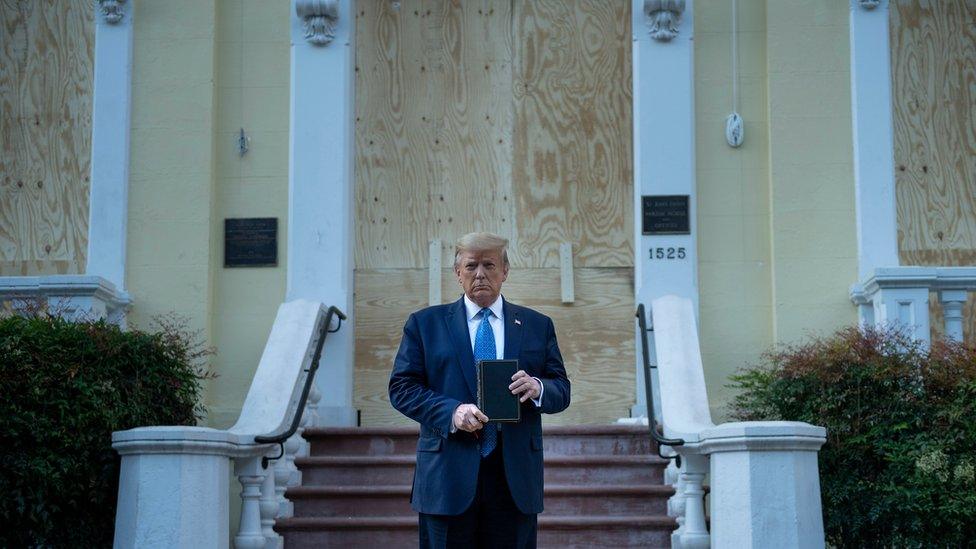
Mr Trump posed in front of a damaged church shortly after police used tear gas to disperse protesters nearby
Saint John Paul "would not condone the use of tear gas and other deterrents to silence, scatter or intimidate [protestors] for a photo opportunity in front of a place of worship," he commented.
Archbishop Gregory is the first African-American to lead the diocese. The shrine is run by the Knights of Columbus, an all-male Catholic organisation that has lobbied for conservative political causes.
Washington's Episcopalian bishop, Mariann Budde, also condemned the president's actions. In the UK the archbishops of York and Canterbury said the unrest exposed "the ongoing evil of white supremacy".

Politics and religion

US President Donald Trump's signalling of religious affiliation has not been welcomed by a range of clerics as the nation struggles to manage the twin challenges of a pandemic and widespread political protest.
President Trump does not belong to a particular congregation, only occasionally attends a service and has said many times that he does not like to ask God for forgiveness.
But while he may not consider church essential to his personal life, it may yet hold the keys to his political future.
In 2016, Mr Trump won 81% of white evangelical votes and exit polls found that white Catholics supported him over Hillary Clinton by 60% to 37%.

What's the latest in the protests?
After New York's iconic department store Macy's and other shops were looted, Governor Andrew Cuomo criticised the police for "not doing their jobs"
Curfews in the city are extended to Sunday, as well as in Philadelphia until Thursday
In Chicago, two people were reported killed amid unrest, although the circumstances are unclear
The Las Vegas sheriff said an officer died in a shooting after police attempted to disperse a crowd, and four officers were injured on Monday in St Louis, Missouri
Crowds gathered in Mr Floyd's hometown of Houston, Texas, for a peaceful march alongside his family
Meanwhile, the state of Minnesota filed a civil rights charge against the Minneapolis Police Department over Mr Floyd's death
And the controversial order to clear protesters from a park near the White House on Monday evening came directly from Attorney General William Barr, US media reported
The chief of police in Louisville, Kentucky was sacked after law enforcement officers fired into a crowd on Sunday night, killing the owner of a nearby business

What's the background?
The protests began after a video showed Mr Floyd being arrested and a white police officer continuing to kneel on his neck even after he pleaded that he could not breathe.
The officer, Derek Chauvin, has been charged with third-degree murder and will appear in court next week. Three other police officers have been fired.
The peaceful protests honouring George Floyd
The Floyd case has reignited deep-seated anger over police killings of black Americans and racism. It follows the high-profile cases of Michael Brown in Ferguson, Missouri; Eric Garner in New York; and others that have driven the Black Lives Matter movement in recent years.
Garner was placed in a police chokehold in New York in 2014 and could be heard crying out "I can't breathe" as officers restrained him. His words, which were also shouted by Mr Floyd in his final moments, have become a rallying cry for Black Lives Matter protesters.
Demonstrators have taken to the streets - not only to express their outrage at the treatment of Mr Floyd - but to condemn police brutality against black Americans more widely.
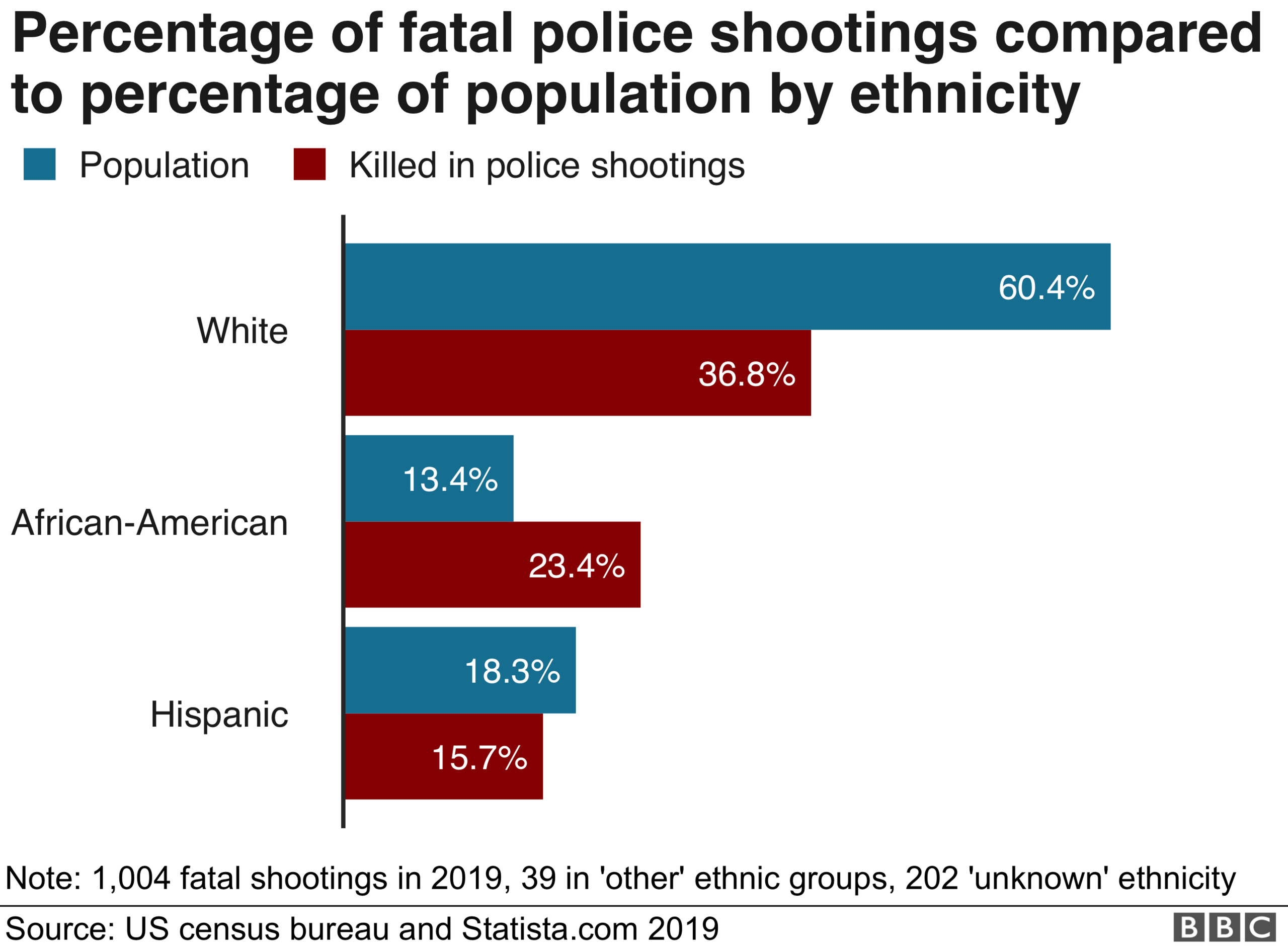
African-Americans are more likely to get fatally shot by police than other ethnic groups. They are also arrested for drug abuse at a much higher rate than white Americans, although surveys show drug use is at similar levels.
For many, the outrage over Mr Floyd's death also reflects years of frustration over socio-economic inequality and discrimination, not least in Minneapolis itself. It has also come amid the coronavirus pandemic, which studies show has disproportionately affected black Americans both in terms of deaths and job losses.
But the protests also echo those of the Civil Rights movement more than 50 years ago. This action was led by Martin Luther King Jr and sought to challenge white supremacy and the segregationist policies that were commonplace at the time.
The ongoing unrest is the most widespread racial turbulence the US has experienced since Dr King, known to most Americans as MLK, was gunned down by a sniper in 1968.

How has the unrest affected you? Share your experiences by emailing haveyoursay@bbc.co.uk, external.
Please include a contact number if you are willing to speak to a BBC journalist.
WhatsApp: +44 7756 165803
Tweet: @BBC_HaveYourSay, external
Send pictures/video to yourpics@bbc.co.uk, external
Please read our terms & conditions and privacy policy
- Published2 June 2020
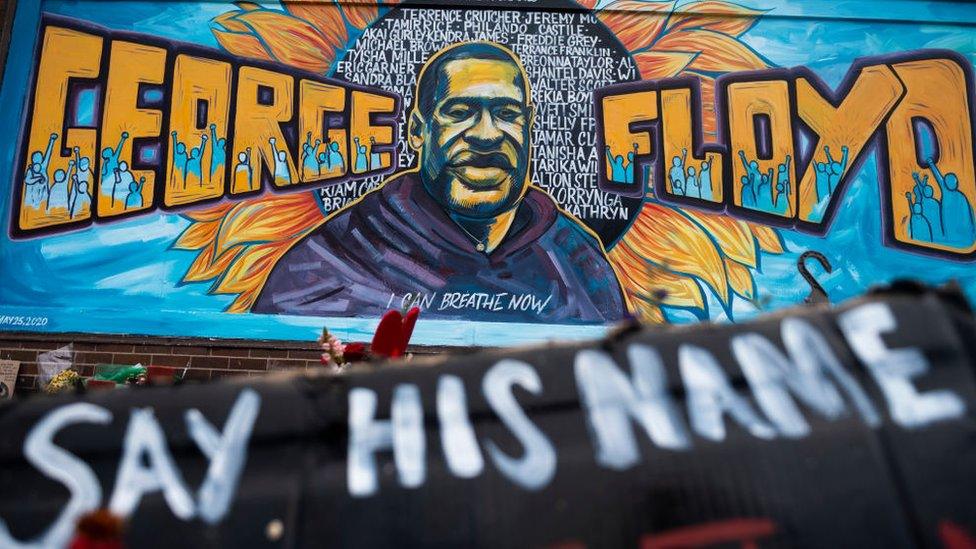
- Published1 June 2020
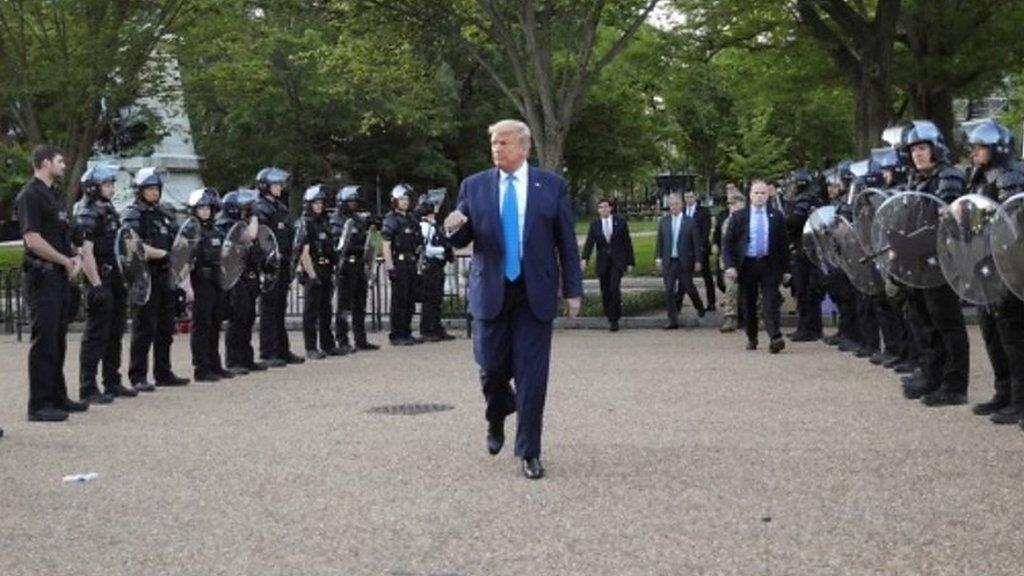
- Published1 June 2020
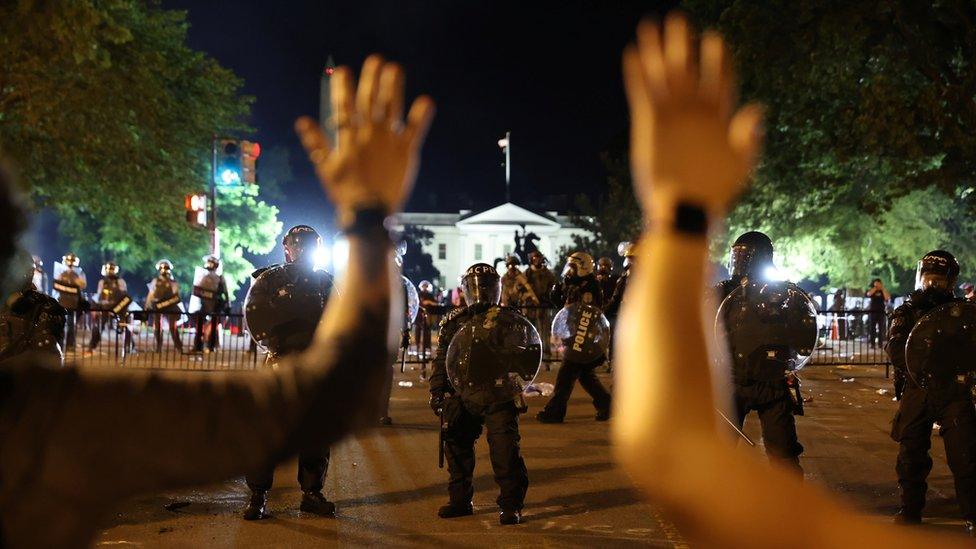
- Published2 June 2020
